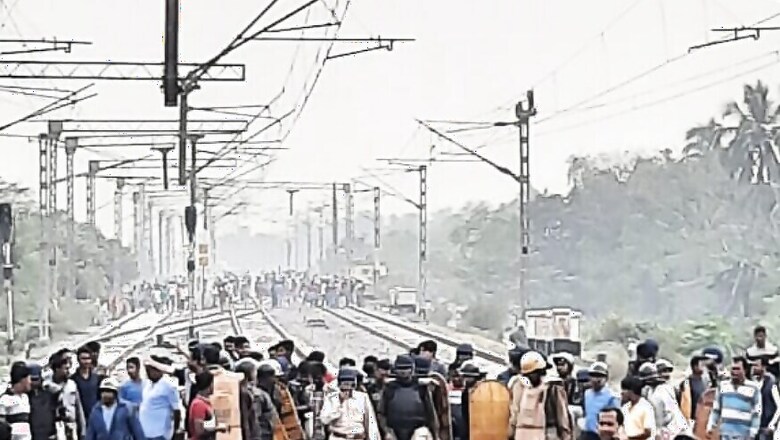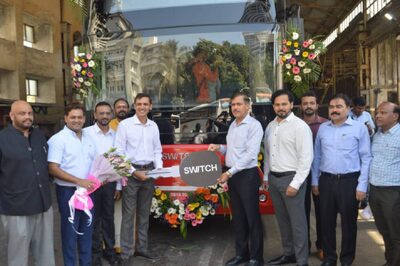
views
Kolkata: West Bengal Chief Minister Mamata Banerjee on Saturday warned of strict action against those involved in violent agitations and vandalism in several places across the state while protesting against the amended Citizenship Act. She appealed to people to maintain calm and protest democratically.
"Do not take up law into own your hand. Do not put up road blockades and rail blockades and create trouble for the common people on the roads," Banerjee said in a statement released from the Chief Minister's Office.
"Do not cause damage to government properties. Strict action would be taken against those who are found guilty in creating disturbances," the statement quoted her as saying.
She also reiterated that the amended Citizenship Act and the proposed country-wide National Register of Citizens (NRC) will not take effect in the state. "It is my request, don't create confusion among people," she said.
“I would like to assure all of you that there is nothing to worry as we will not allow Citizenship Amendment Act and NRC in Bengal. If you want to protest against the two, do it peacefully,” she said.
Protests over the amended Citizenship Act have reached the shores of West Bengal with agitators resorting to violence and arson at railway stations and thoroughfares across the state, seeking immediate revocation of the law.
Kolkata Mayor Firhad Hakim also condemned the violent protests. He said, “I don’t support such acts. We want law and order to be maintained in the state as general public are facing a lot of inconveniences due to the shutdowns on national highways and protests on railway tracks.”
Earlier in the day, set six private buses were set on fire on the Kona Expressway and the Sankrail railway station was completely damaged, following which train services badly affected in the South-Eastern section.
Murshidabad’s Beldanga continued to burn for the second day as a mob set ablaze three fire tenders. They also put up road blockades and raised slogans against the Bharatiya Janata Party (BJP) and its plans to implement the citizenship Act and NRC in Bengal.
On Friday, protestors set the Beldanga railway station on fire, while some of them even tried to snatch weapons from personnel of the Railway Police Force (RPF).
BJP’s south Murshidabad unit chief Gauri Shankar Ghosh said, “People are living in fear. Today morning, I found that some families have fled their respective villages in our locality and taken shelter in Devipur and Sagarpara.”
Local Congress MLA Safiujjaman Seikh, said, “I agree that some people may have left their homes due to panic in some parts of Murshidabad. I would like to request the TMC leaders to organise their protest rallies in a sensible manner to avoid any law and order crisis in the state.”
Similar protests were witnessed in Kolkata, Howrah, North 24 Paganas, and East Midnapore. In these places, mobs blocked railway tracks, damaged government properties and attacked truck drivers on national highways.
In East Midnapore, BJP general secretary Sayantan Basu’s car was attacked by protesters. Later, he was rescued by the district police.
The amended citizenship Act promises to grant citizenship to non-Muslim refugees from Pakistan, Bangladesh and Afghanistan fleeing religious persecution. On December 4, the Union Cabinet passed the Bill, following which it was passed in both the houses of Parliament.
The legislation has put the northeast on the boil as people fear that it may exacerbate the problem of illegal immigration, while Muslims across the country apprehend the move could be a precursor to the country-wide implementation of the National Register for Citizens (NRC).
In Bengal, the legislation was a long-pending demand of the Matua community whose members mostly came to India from Bangladesh after 1971.
Though they have been given voting rights, the earlier version of the Act did not recognize the same because Article 6 of the Constitution says anybody who entered India from East or West Pakistan after July 19, 1948, would have to apply for citizenship.
However, soon after the Bill’s passage, people in Murshidabad hit the streets as a majority (nearly 67 per cent) of the population in the district belongs to the minority community.
Of the state’s nearly 30 per cent Muslim population, 22% lives in Kolkata, while 67% lives in Murshidabad district. North Dinajpur and Malda have the second and third-highest concentration of Muslims, percentage-wise — 51 per cent and 52 per cent, respectively.




















Comments
0 comment